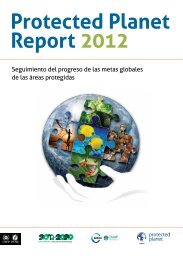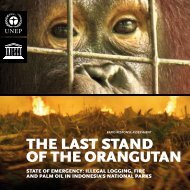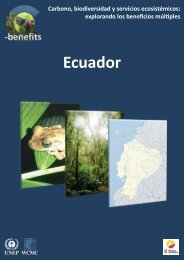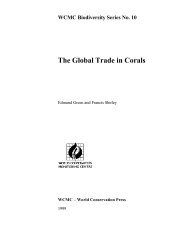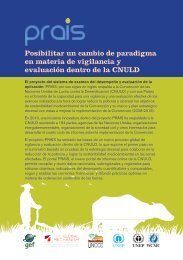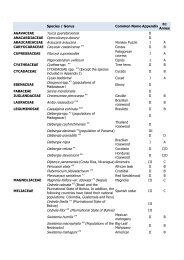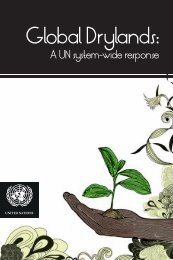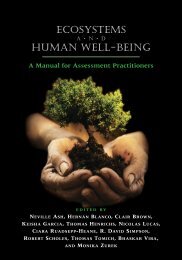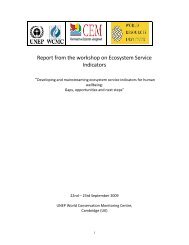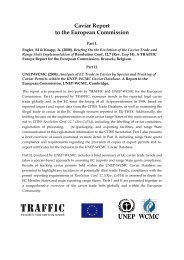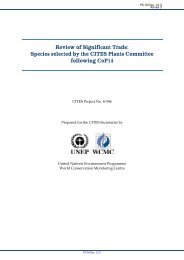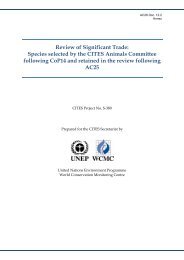FOREST LANDSCAPE RESTORATION - UNEP World Conservation ...
FOREST LANDSCAPE RESTORATION - UNEP World Conservation ...
FOREST LANDSCAPE RESTORATION - UNEP World Conservation ...
You also want an ePaper? Increase the reach of your titles
YUMPU automatically turns print PDFs into web optimized ePapers that Google loves.
xxi<br />
Constraints<br />
Constraints for introducing FLR that emerged from analysis of sector policies and ongoing policy initiatives include:<br />
• Forestry is not included amongst the priority funding sectors in Tanzania.<br />
• Extension efforts on forestry and environmental conservation have reached very low proportion of the local<br />
community (below 5 percent of the target group).<br />
• FLR concept is new hence it may take time for people to understand it.<br />
Priority areas for promoting FLR<br />
Generic priority areas for promoting FLR include:<br />
• Awareness creation to policy and decision-makers’ on FLR concept and its contribution to national development<br />
priorities to eradicate poverty and ensure sustainable environmental conservation.<br />
• Provision of extension services to village governments to provide enabling capacity for initiating FLR programmes<br />
through local initiatives.<br />
• Establishment of a FLR network system to intensify sharing of field experiences and minimise duplication of<br />
efforts.<br />
Conclusions<br />
Based on results and lessons discussed in this study it can be concluded that:<br />
• Overall national development strategies, sector policies and on going forestry initiatives to implement the forest<br />
policy of 1998 have strong supporting elements to FLR.<br />
• Consideration of forest functions within the concepts of FLR will intensify contribution of the forestry sector to<br />
national priorities of eradicating poverty and environmental conservation. It will also support the priority sectors of<br />
agriculture, health, nutrition, education, water and transport to achieve their development goals.<br />
Recommendations<br />
Concerted efforts by all stakeholders are required to fully utilise the existing opportunities for introducing and<br />
promoting FLR in Tanzania as a component of achieving national socio-economic development priorities.<br />
The few constraints identified provide a starting challenge for introducing FLR. It is recommended to find solutions to<br />
the constraints through community participation, multi-sectoral co-operation and adoption of efficient resource<br />
utilisation technologies.<br />
Understanding and considering the different functions of forest services and products to society economic and social<br />
development by managers, planners, politicians and users of forests will enhance implementation of FLR. An important<br />
starting point for FLR is to integrate forest functions into policies, both economic and environmental policies at village<br />
to national level. Policy makers and planners in the different sectors with policies supporting sustainable conservation<br />
of natural resources should be in the forefront in devising systems of forest valuation and contribute in creating<br />
awareness on the realistic value of forests to livelihood and poverty reduction.<br />
Awareness creation on FLR could intensify informed consensus by stakeholders on forest functions and its contribution<br />
to enhanced human well being and poverty eradication.<br />
Knowledge and recognition of forest conservation taking the landscape approach was observed to be low in six sector<br />
policies namely agriculture/livestock, fishery, energy, women development and gender, mineral and youth. Efforts are<br />
therefore required to intensify awareness of sector policy makers and planners on the concept of managing natural<br />
resources taking into account the landscape approach.<br />
Consideration and skills to adopt the FLR parameter on flexibility for negotiations aimed at building consensus about<br />
forest restoration was observed to be weak in most sector policies reviewed including the forestry sector. Training on<br />
flexibility for building consensus about forest restoration could be a component of introducing and promoting FLR.



